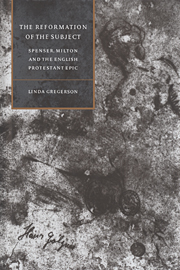Book contents
- Frontmatter
- Contents
- Acknowledgments
- Introduction
- 1 Emerging likeness: Spenser's mirror sequence of love
- 2 The closed image
- 3 Narcissus interrupted: specularity and the subject of the Tudor state
- 4 The mirror of romance
- 5 Fault lines: Milton's mirror of desire
- 6 Words made visible: the embodied rhetoric of Satan, Sin, and Death
- 7 Divine similitude: language in exile
- List of works cited
- Index
5 - Fault lines: Milton's mirror of desire
Published online by Cambridge University Press: 08 October 2009
- Frontmatter
- Contents
- Acknowledgments
- Introduction
- 1 Emerging likeness: Spenser's mirror sequence of love
- 2 The closed image
- 3 Narcissus interrupted: specularity and the subject of the Tudor state
- 4 The mirror of romance
- 5 Fault lines: Milton's mirror of desire
- 6 Words made visible: the embodied rhetoric of Satan, Sin, and Death
- 7 Divine similitude: language in exile
- List of works cited
- Index
Summary
Eve at the lake
That day I oft remember, when from sleep
I first awak't …
The constitution of subjectivity is the project and the recurrent theme of Paradise Lost, as it was the project and recurrent theme of The Faerie Queene. For Spenser, “subjectivity” has a peculiarly monarchical resonance: the “gentleman or noble person” his poem seeks “to fashion … in vertuous and gentle discipline” (“Letter to Raleigh”) is first and most enduringly a subject of the Queen. The poem is a “mirrhour” (FQ II Proem 4) in which the Queen and her subject behold a likeness wrapped “in shadowes light” (FQ II Proem 5). That likeness includes the monarch's person, her ancestry, her lands, the church that endorses her sovereignty in opposition to Rome, the political imperatives that a poet and his patrons may wish to attribute to her, the community of faith and nation whose imagined future she consolidates. The Queen, thus represented, is a mirror in which the English gentleman may find himself, may find, that is, his locus of public authority and personal desire.
The readerly evolution of subjectivity is, if anything, of greater moment in Paradise Lost. The likeness drawn in shadows is now the face of God, and God himself has drawn that likeness in human flesh: the subject of Milton's poem, as of the Christian Bible, is the reading subject's creatureliness.
- Type
- Chapter
- Information
- The Reformation of the SubjectSpenser, Milton, and the English Protestant Epic, pp. 148 - 197Publisher: Cambridge University PressPrint publication year: 1995

